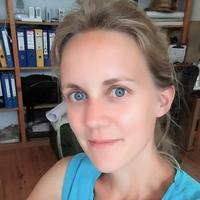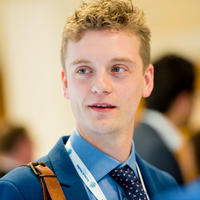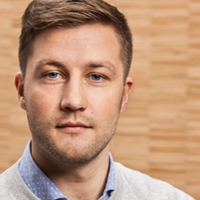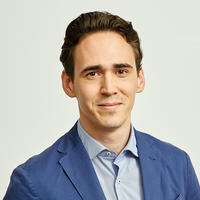New Social Science Innovation Fellows announced
Innovation activities across the social sciences are set to be boosted over the coming year as the Division welcomes a new cohort of Social Science Innovation Fellows.
The Innovation Fellows and their teams, who span five departments across the Division, will help to support an academic-led culture change in innovation across the social sciences, making it easier for researchers to engage in innovation, and helping to make it a more valued part of research.
Acting as ambassadors for innovation, the Fellows will help to drive an inclusive and supportive culture of innovation among social scientists at the University of Oxford. They will also work closely with researchers from across the Aspect partnership: the universities of Glasgow, Edinburgh, Cardiff, and Sussex.
Meet the Social Sciences Innovation Fellows 2022/23
Dr Patrick Thomson, Senior Research Associate, School of Geography and the Environment

Dr Patrick Thomson
Patrick works at the interface of research and implementation, focusing on innovative socio-technical approaches to rural water supply. This research combines social science, natural science and engineering and has included establishing a spin-out social-enterprise in Kenya, which now operates independently maintaining rural water systems. As a Social Science Division Innovation Fellow, Patrick plans to continue building a network of like-minded researchers across Social Science Division to foster innovation and nurture collaboration. This will bring together expertise and experience from members of staff from different departments, and build links between the Division and the wider innovation ecosystem at Oxford.
Dr Ine Jacobs, Stavros Niarchos Foundation Associate Professor of Byzantine Archaeology and Visual Culture, School of Archaeology
Team: Katerina Vavaliou, Research Assistant for Archaeology Partnerships; Robyn Mason, Communications Officer; and Miranda Creswell, Artist-in-Residence, School of Archaeology.

Dr Ine Jacobs
Ine's Innovation Fellowship, 'Archaeology Partnerships: Devising a Design Strategy for the Social Sciences', will create a design strategy for Knowledge Exchange and Engagement for Social Sciences, using the School of Archaeology (SoA) as a case-study. The team will explore the ways in which researchers and students can look beyond already invested audiences and partners, i.e. academics and museums, and explore the need for and expectations from successful engagement between academia and the wider archaeological sector, including charities, social enterprises, and businesses.
Through a series of seminars, the team will also encourage academics, early career researchers, and students to envision and harness the benefits of potential collaborations with the business sector by showcasing archaeological innovation beyond academia. Finally, Ine and her team will set up a workshop for members of the Division to explore underused methods of engaging with non-academic audiences, prioritising visual tools.
On being awarded her Innovation Fellowship, Ine said 'I am looking forward to creating new ties and strengthening existing ones between Oxford’s world-leading academic expertise and external partners. I strongly believe in the multifaceted benefits of archaeology for wide audiences and the potential it has to deepen our understanding of what makes innovation in Social Sciences.'
Dr Nick Dickinson, Bingham Fellow in Constitutional Studies Department of Politics and International Relations

Dr Nick Dickinson
Social scientists might not think about commercialisation because they may not know the practical steps to take in order to move an idea towards an implementable project. This “barrier of the first step” can prevent many social scientists from pursuing commercialisation of research. Nick seeks to overcome this challenge through his Innovation Fellowship by de-mystifying what commercialisation means and providing accessible stories and role models for researchers.
Through an exciting new podcast series, Nick will interview researchers in the social sciences with direct experience of commercialising research and developing projects from their work. The Fellowship will also enable him to organise a retreat for researchers who have idea-stage projects to begin the practical steps to commercialisation.
Reflecting on the opportunity presented by the Social Sciences Innovation Fellowship, Nick said, 'As a political scientist, I’m used to thinking about the impact of research in terms of interaction with government. But in an era where governments are ever more interested in working with the private sector, it's increasingly vital that social scientists can do so too – and this Innovation Fellowship is a fantastic opportunity to be involved in that.'
In an era where governments are ever more interested in working with the private sector, it's increasingly vital that social scientists can do so too – and this Innovation Fellowship is a fantastic opportunity to be involved in that.
Dr Nick Dickinson, Social Science Innovation Fellow
Dr Fabian Stephany, Departmental Research Lecturer, Oxford Internet Institute with Dr Fabian Braesemann, Research Fellow and Data Scientist, Saïd Business School

Dr Fabian Braesemann

Dr Fabian Stephany
Fabian and Fabian plan to organise a programme of events and resources around data-based and digital innovation in the social sciences, with the aim of encouraging potential social science entrepreneurs at the University.
Through virtual workshops with stakeholders knowledgeable in driving innovation in the social sciences, the pair will gather ideas, opinions, best practice examples and success stories about social science innovation. They also plan to host an on-site social datathon event that will ask the participants to design data-driven social science innovation for real-world development issues.
'As social data scientists, we aim to reveal the complex interactions that shape today’s digital economy', they explain. 'We believe that data and social data science can help people and institutions to better understand and manage the complex business, social and economic problems of the globalised world. We hope that our Fellowship initiatives can spark new initiatives and contribute towards a step-change in innovation activities in the social sciences, making it easier for researchers to engage in innovation.'


